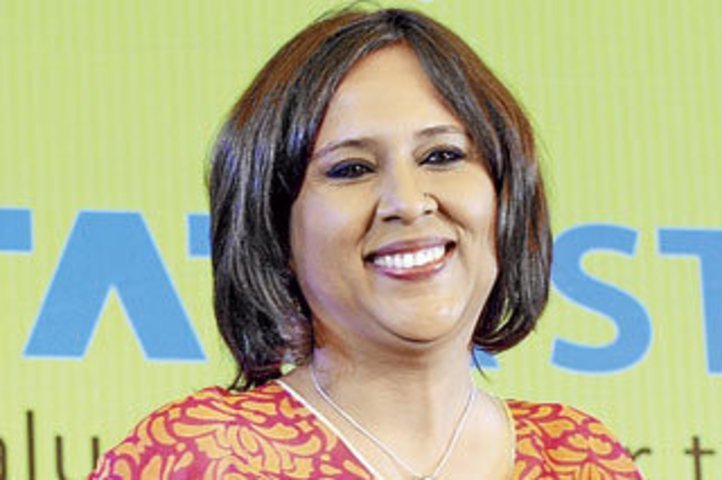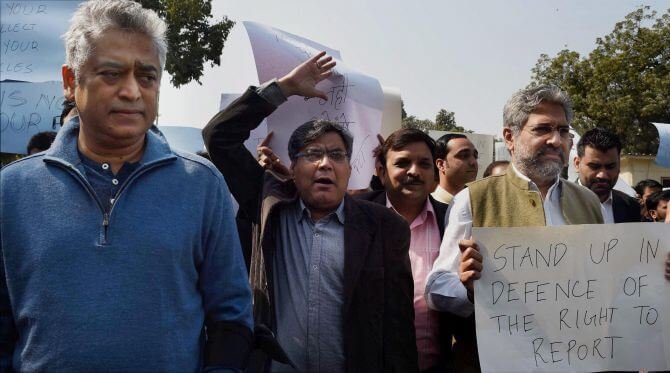Word has spread: “Barkha and Arnab are fighting!” The crowd has gathered. It’s the usual crowd that gathers around every such spectacle – a crowd of supporters of one combatant or the other, and assorted onlookers. Some of them are in the crowd simply from curiosity. They will leave after the fight is over, and take their idle curiosity to the next place where a crowd is gathering.
Television news thrives on similar spectacles. Arnab Goswami, star anchor of Times Now, has achieved fame and what passes for success in a world where success is measured in numbers. He’s done so by turning his studio into an arena for the verbal equivalent of WWF wrestling. There, he plays the role of a judge who decides the winner – not on the basis of points they score, but by figuratively hitting the combatants he does not like on the head with ringside chairs. Mr Goswami knows who he thinks should win the bout every day – and that is all that matters.
This is certainly a vast expansion of the role he began with, since Mr Goswami was actually supposed to be a commentator. He entered the arena wearing a commentator’s badge, proceeded to leap into the ring and take on the role of judge and jury, and eventually decided that it was not enough for him merely to ensure a free and fair bout and keep score. He would also have to become executioner – because he was all that stood in the way of the ultimate triumph of evil over good.
He was not the first or the only journalist to take on this kind of role. However, few people in elite circles complained, because the biases of those other observers who had become participants happened to be biases the elites liked. The blows they struck were mightily cheered.
Thus, the absurd reportage of novelist Arundhati Roy, who wrote an essay with a blurb that described Maoists as Gandhians with guns, was praised. The shrill denunciations of Sagarika Ghose drew no adverse remarks from the same people who rail against Arnab for his shrill denunciations. The tabloidisation of The Telegraph’s front page was cheered, because the gimmicky headlines were aimed against the BJP’s ministers.
The fact that some commentators were active participants in the political ring rather than mere observers hit headlines through the release of the Radia tapes. It was evident that they were suspiciously thick with particular lobbyists and political parties. Barkha Dutt’s credibility, and that of several other prominent journalists, suffered as a result.
What the elite, the people in the VIP boxes, failed to realise was that anger was building up among the spectators that all the commentators were ganging up on the Left side of the ring, and only knocking the participants on the Right. Arnab arrived on the scene as their champion, the pehelwan of the plebeian nationalists, restorer of balance in an unfair world.
It is not the job of journalists to become combatants in ideological battles.
Unfortunately, somewhere along the way, most journalists forgot that. They had been told – wrongly – that it was their job to fight the good fight, and so, charged with a sense of moral duty, they leapt in. And the descent down the slippery slope began.
For every Arnab and Barkha and Sagarika to imagine that they have seen the Eternal Truth, with a capital T, and are now prophets who will proclaim it unto the world, is a bit delusional.
As Gandalf the Grey said in J.R.R. Tolkien’s Lord of the Rings, “Even the very wise cannot see all ends”. No human being alive on earth today can predict how tomorrow will turn out. The final outcome of any significant event or action lies in the future. We do not know where it may lead.
All we have are expectations and opinions. Those expectations and opinions are inevitably based on incomplete information, because knowledge itself keeps expanding. The basis of the scientific method is that today’s theories about the world and how things really are could change tomorrow. The proper scientific attitude is one of eternal scepticism, not blind faith in any theory or ideology. Of course, this is not an argument against reason or empirical data; it is an argument against hubris, because we simply do not know what we do not know. There are unknown unknowns.
Our cherished beliefs, on the basis of which we take and give lives, often turn out to be faulty. A few centuries from now, many of our own beliefs about the world may seem misplaced.
Mr Goswami’s apparent belief that the country has to choose between supporting the country’s soldiers and supporting Afzal Guru and Yakub Memon is silly. The state he comes from, Assam, has plenty of former extremists roaming around free. What is his position on Arabinda Rajkhowa, Chairman of ULFA, who waged war against the Indian state and is now out on bail in Assam? Or Ranjan Daimary, chief of the NDFB, who did the same? If he is such a hyper-nationalist, can he support bail for leaders of groups that waged war against the state?
The wisdom of compelling the entire media to be nationalistic is in any case highly questionable, even from the perspective of national interest. The American media, in the days before the invasion of Iraq became very nationalistic. Newspapers and channels were unanimous in their denunciations of Saddam Hussein, and their certainty that he was building a Weapon of Mass Destruction.

The invasion of Iraq was spurred on by the nationalistic American media. Since then, 2,51,000 people have died in Iraq alone as a result of the ensuing violence, and the number is still growing. America has spent more than $2 trillion, which is around INR 134,15,09,00,000,000 on the war. According to a site called ihtd.org, this would be equivalent to a stack of 1000 dollar bills over 200 kilometres high.
The resulting destabilisation of the region has spilled over to Syria, with further disastrous consequences. Of course, no WMD was ever found, since none existed. If the American media had been less nationalistic, the entire tragedy might have been avoided.
It is not the media’s job to drum up support for war or against. Drumming up support for terrorists can draw criminal charges.
Nor is it our job to drum up support for Narendra Modi, or against. It is the media’s job to report the facts about events, policies and in some cases, people, as fairly and honestly as possible, keeping public interest in mind. Objectivity may be humanly impossible, but impartiality is quite easy.

There is a place for journalists to call out factual errors and correct them. There’s also a place for editorial opinion. The editorial opinion is meant to be an informed opinion. The information is meant to come from the reportage.
If reporting budgets are shrunk, and actual ground reports decrease while studio tamashas increase, it is likely that the facts on which loud arguments are based are not being properly verified. Incorrect or insufficient information often leads to incorrect conclusions – and this can happen to even the best news organisations and most powerful countries in the world, as we saw in Iraq and Syria.
We serve the national interest by trying to tell the contextualised truth about events and places as fairly as possible. We serve neither the nation’s interest, nor our own, by currying favours with the Congress or BJP, or becoming ideological warriors of the anachronistic Cold War categories of Left or Right.
The way out of our current phase in Indian media where the medium has become the spectacle, is to stop thinking we have all the answers to everything every day, and start by returning to our places on the ringside of politics and policy, as commentators, not combatants. A slightly boring identity, but one which would be less disastrous to both us in the media and our readers and viewers.
(The writer is a newspaper editor and author from Shillong who lives and works in Mumbai)

















